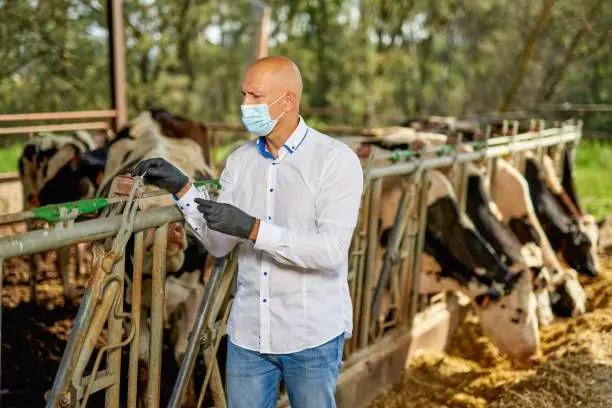Using protective gear during milking is important to reduce the chance of transmitting pathogens from cows to humans, maintaining worker safety and the quality of dairy products.
Image credits: Unsplash

October 5, 2024: A third possible human case of bird flu has been identified in California, with the individual having had contact with infected dairy cattle in the Central Valley. Specimens are currently being sent to the CDC for confirmatory testing. Despite this new case, health officials maintain that the risk to the public remains low. Importantly, none of the individuals have required hospitalization.1
In the last 30 days, 79 livestock herds have been affected by the virus in California, underscoring the seriousness of the situation.2 All three reported human cases involved individuals who interacted with animals at different farms. The latest case mirrors the previous two, with the individual experiencing mild symptoms such as conjunctivitis, eye redness or discharge. In late March 2024, a dairy farm worker in Texas tested positive for the H5N1 virus after experiencing symptoms like eye discomfort.3
The California Department of Public Health (CDPH) emphasizes that while the public is not at significant risk, those in direct contact with infected animals—particularly farm workers—are at an elevated risk for contracting the virus. To mitigate this risk, CDPH recommends the use of personal protective equipment (PPE), including N95 masks, eye protection, and gloves for anyone working with potentially infected animals or materials.
3 Key Takeaways
- A third possible human case of bird flu has been reported in California, but health officials confirm that the public risk remains low, with no hospitalizations among those affected.
- The California Department of Public Health emphasizes the need for PPE for farm workers and reinforces biosecurity measures to prevent the spread of the virus.
- CDPH assures consumers that pasteurized milk and dairy products are safe, urging avoidance of unpasteurized dairy due to potential health risks from pathogens like Salmonella and avian influenza.
The California Department of Public Health (CDPH) reassures the public that pasteurized milk and dairy products are safe for consumption, as the pasteurization process effectively inactivates the bird flu virus. Additionally, milk from sick cows is prohibited from entering the public milk supply. Salmonella and avian influenza viruses, including H5N1, known to persist on milking equipment and in raw milk. Health officials stress the importance of pasteurization to ensure safety, as there are no proven health benefits to consuming raw milk. Given the potential health risks, especially for vulnerable populations, consumers are advised to avoid unpasteurized dairy products and remain aware of biosecurity measures in dairy farming to prevent contamination.4
In response to the outbreak, CDPH has coordinated outreach to dairy producers and farm workers regarding preventive measures. Over the past four months, the department has distributed more than 340,000 respirators, 1.3 million gloves, 160,000 goggles and face shields, and 168,000 bouffant caps to protect farm workers. The agency is also working with local health departments to ensure health checks for exposed individuals and to facilitate testing and treatment as necessary.1
CDPH is collaborating with the California Department of Food & Agriculture (CDFA) to safeguard human and animal health, employing surveillance tools to monitor the bird flu situation. Additionally, California has received 5,000 extra doses of seasonal flu vaccine from the CDC for farm workers, which CDPH plans to distribute to local health departments in dairy-heavy regions.1
For those exposed to infected animals, CDPH advises monitoring for symptoms such as cough, sore throat, fever, and conjunctivitis for 10 days following exposure. If symptoms develop, individuals should isolate and contact their local public health department for guidance.1
While the seasonal flu vaccine does not protect against bird flu, CDPH encourages all Californians, especially those at risk, to get vaccinated to reduce the chances of co-infection and severe illness.
References
- Third Possible Human Case of Bird Flu Detected in California. October 5, 2024. Accessed October 8, 2024. https://www.cdph.ca.gov/Programs/OPA/Pages/NR24-030.aspx#
- 2. HPAI Confirmed Cases in Livestock. Updated October 7, 2024. Accessed October 8, 2024. https://www.aphis.usda.gov/livestock-poultry-disease/avian/avian-influenza/hpai-detections/hpai-confirmed-cases-livestock
- Highly Pathogenic Avian Influenza A(H5N1) Virus Infection in a Dairy Farm Worker. The New England Journal of Medicine. May 3, 2024. Accessed October 7, 2024. doi: 10.1056/NEJMc240537
- CDC. Highly Pathogenic Avian Influenza A(H5N1) Clade 2.3.4.4b Virus Infection in Domestic Dairy Cattle and Cats, United States, 2024. Emerging Infectious Diseases. Volume 30, Number 7—July 2024. Accessed October 7, 2024. https://wwwnc.cdc.gov/eid/article/30/7/24-0508_article








